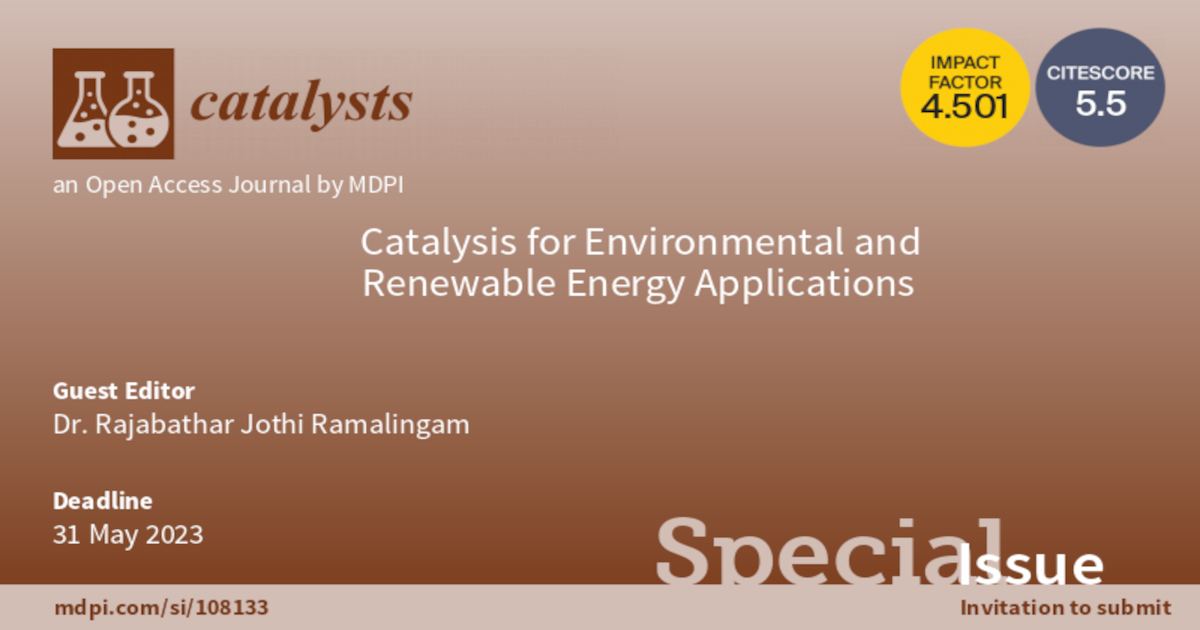- 4.0Impact Factor
- 7.6CiteScore
- 17 daysTime to First Decision
Catalysis for Environmental and Renewable Energy Applications
This special issue belongs to the section “Catalysis for Sustainable Energy“.
Special Issue Information
Dear Colleagues,
Catalysts are extensively used in different technologies and play a fundamental role in the efficient generation of renewable energy and pollution and gas emission control. The development of porous catalysts from low-cost methods with nano Architex structures could open new avenues in the field of the future catalysis industry. Despite the fact that catalysts have remarkable performance, they pose, in some cases, a negative environmental impact due to their massive use, which is imposed by intensive production strategies. Therefore, a reorientation in the search of new materials, such as environmentally friendly catalysts, is urgently needed. Hence, the development of novel EFCs to face sustainable energy production and climate change problems, as well as to abate industrial emissions, has become a challenge in the current research fields. The perovskites, metal-organic framework materials, and nanocarbon from waste plastic could be focused for the future.
A great variety of catalytic materials, which include single metals as well as mixed metals (and their oxides), is currently being used, either supported over alumina, silica, titania, ceria, zirconia, activated carbons, and zeolites. In a similar way to make alternative attractive materials with a lower cost and less polluting, side product methodology is the main focus of the present Special Issue. Nanoparticles or nanomaterials with a porous nature research topic are also welcomed in this Special Issue.
Dr. Rajabathar Jothi Ramalingam
Guest Editor
Manuscript Submission Information
Manuscripts should be submitted online at www.mdpi.com by registering and logging in to this website. Once you are registered, click here to go to the submission form. Manuscripts can be submitted until the deadline. All submissions that pass pre-check are peer-reviewed. Accepted papers will be published continuously in the journal (as soon as accepted) and will be listed together on the special issue website. Research articles, review articles as well as short communications are invited. For planned papers, a title and short abstract (about 250 words) can be sent to the Editorial Office for assessment.
Submitted manuscripts should not have been published previously, nor be under consideration for publication elsewhere (except conference proceedings papers). All manuscripts are thoroughly refereed through a single-blind peer-review process. A guide for authors and other relevant information for submission of manuscripts is available on the Instructions for Authors page. Catalysts is an international peer-reviewed open access monthly journal published by MDPI.
Please visit the Instructions for Authors page before submitting a manuscript. The Article Processing Charge (APC) for publication in this open access journal is 2200 CHF (Swiss Francs). Submitted papers should be well formatted and use good English. Authors may use MDPI's English editing service prior to publication or during author revisions.
Keywords
- metal oxide
- polymer composite
- nanoparticles
- porous materials
- renewable energy
- bio fuel
- solar energy harvesting
- biowaste catalyst
- carbon dioxide reduction

Benefits of Publishing in a Special Issue
- Ease of navigation: Grouping papers by topic helps scholars navigate broad scope journals more efficiently.
- Greater discoverability: Special Issues support the reach and impact of scientific research. Articles in Special Issues are more discoverable and cited more frequently.
- Expansion of research network: Special Issues facilitate connections among authors, fostering scientific collaborations.
- External promotion: Articles in Special Issues are often promoted through the journal's social media, increasing their visibility.
- e-Book format: Special Issues with more than 10 articles can be published as dedicated e-books, ensuring wide and rapid dissemination.

